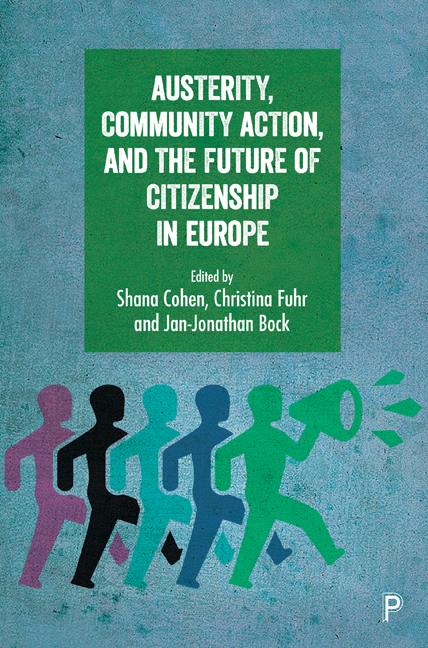Book contents
- Frontmatter
- Dedication
- Contents
- Acknowledgements
- Notes on contributors
- one Introduction: social activism, belonging and citizenship in a period of crisis
- Part I The social consequences of welfare policy
- Part II The practice of social good
- Part III Social change and neoliberalism
- Part IV Situating solidarity in perspective
- Index
Four - Austerity and social welfare in the UK: a perspective from the advice sector
Published online by Cambridge University Press: 05 April 2022
- Frontmatter
- Dedication
- Contents
- Acknowledgements
- Notes on contributors
- one Introduction: social activism, belonging and citizenship in a period of crisis
- Part I The social consequences of welfare policy
- Part II The practice of social good
- Part III Social change and neoliberalism
- Part IV Situating solidarity in perspective
- Index
Summary
The advice sector has always had a pivotal role in assisting the destitute and most vulnerable in society. With austerity, its pivotal role has increased in importance, particularly in the United Kingdom (UK). The roots of austerity can be traced to the financial crisis of 2008 (Oxfam, 2013), which required the UK government to bail out British banks to prevent a collapse of the banking system; this led to an economic recession considered to be one of the worst in British history.
The cost of the bail-out is considered to be in the region of £141 billion, with estimated liabilities amounting to over £1 trillion (NAO, 2013). The Labour government introduced counteractive measures in the form of a fiscal stimulus programme (BBC, 2008) (including a temporary reduction in VAT and bringing forward investment spending) in an attempt to revive and stabilise the economy, which temporarily staved off the full impact of austerity.
Following the general election in 2010, the newly formed Conservative–Liberal Democrat coalition government promptly withdrew the stimulus programme and implemented severe spending cuts, mainly in the form of cuts to social security and public services, which the government felt were necessary to reduce the budget deficit and promote economic growth (HM Treasury, 2010).
This is the point at which the advice sector felt the full blast of austerity. There was a heightened demand for free advice that was difficult to meet due to the reduction in funding and resulting effect on service delivery. This necessitated large organisations within the sector to consider more creative and effective ways of enabling members of the public to access services, information and advice to help them with their problems.
Citizens Advice has always been a key player within the advice sector and is the UK's largest provider of free advice for members of the public. It is a network of 316 independent charities (referred to as Citizens Advice Bureaux, or CABs) throughout the UK that gives free, confidential, impartial and non-judgemental information and advice to assist people with the problems they face. The twin aims of the Citizens Advice service are to provide the advice people need for the problems they face and to improve the policies and principles that affect people's lives.
- Type
- Chapter
- Information
- Austerity Community Action and the Future of Citizenship , pp. 65 - 80Publisher: Bristol University PressPrint publication year: 2017

